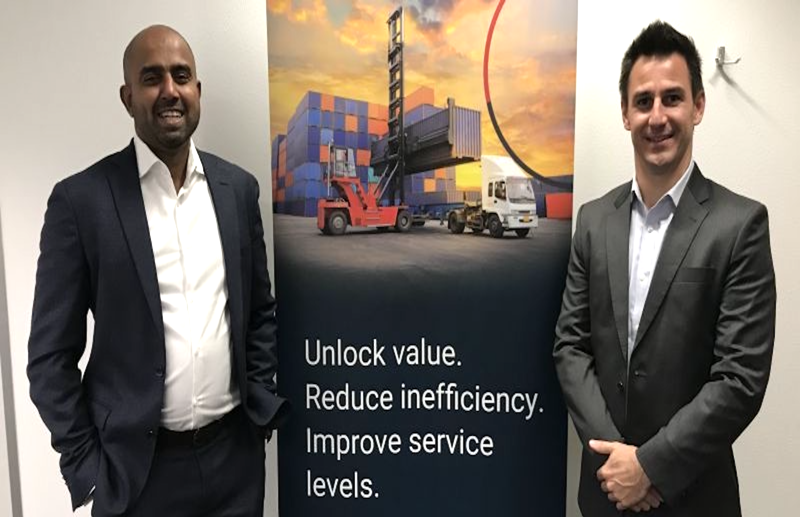This article has been translated. Read the original here.
Containerchain set off under its current name some ten years ago in Australia. Since then, it has focused on delivering integrated software solutions for container logistics “from port to door and back again.” Target groups are both carriers and hauliers, inland terminals and container depots as well as shippers and logistic service providers.
DNA in transport
“We build a horizontal bridge between the vertical systems set up by all parties involved and bring them together into one ecosystem”, says founder and CEO Tony Paldano (pictured left).
“We are a technology company but our DNA comes from the sector. Half of our staff are people from transport and logistics who know perfectly what the needs of the market are. That allows us to offer technology which can be embedded deeply in the operational processes of our customers and as such results in real digitization”, continues Paldano.
By its own account, the company wants to create the leverage for real change. “Digitization of manual processes is not the answer. Real digitalization requires a company to rethink its processes completely. It’s exactly in that kind of change management that we can contribute.”
In Belgium, Containerchain has hired Eric Noterman, the former CEO of Van Moer Logistics, as their strategic advisor. “Container logistics is a global business and we have the ambition to operate globally. But if you do not link this to a local strategy, you can't be truly successful”.
Outlook to Europe
In Australia and New Zealand Containerchain has a proven track record. Big groups like Qube Logistics and Toll show up in their customer list. The next logical step was expansion into South-East Asia, where the group’s own branch offices are located in Singapore, Hong Kong, and Malaysia. In Singapore, 21 independent container depots and also terminal operator PSA make use of Containerchain’s software.
The Australians now focus on Europe. As a supplier of applications for container logistics, their first priority is to look at the three biggest ports in the Nort-European range and their respective hinterland.
Earlier this year Containerchain opened a branch office in Hamburg and Patrick Mertens, a former Hamburg-Süd man, started working out of Rotterdam as general manager Europe.
Branch office in Antwerp
But the first operational branch office in the Benelux will be in Antwerp. Next month Containerchain wants to open the doors of its branch in the port of Antwerp. In the meantime, the recruitment process for a commercial manager and other employees has started. In the longer term, both the Hamburg and the Antwerp office will have about 5 employees.
The choice for Antwerp is not by accident, underlines chief operating officer Chris Collins (pictured right). “Hamburg came first because an important customer requested it. But we have the feeling that with our products in Antwerp we can cater a real demand for solutions which will help to enlighten the congestion in a structural way like we have done successfully in other markets. Once Antwerp is up and running, Rotterdam will be next.
Complementary to NxtPort
The platform offered by Containerchain goes perfectly together with initiatives like Nxtport, assures Tony Paldano.
“We are complementary to Nxtport. Platforms stimulating the exchange of data within a community and reinforcing the awareness of all stakeholders in this field are exactly what we welcome. This community thinking is also our belief. With Nxtport, Antwerp proves it has a vision when it comes down to digitization. All parties involved have to realize that they will get the worst of it from an economic point of view if they do not go the way of digitization, and that not one party can tackle the problem on its own.”
